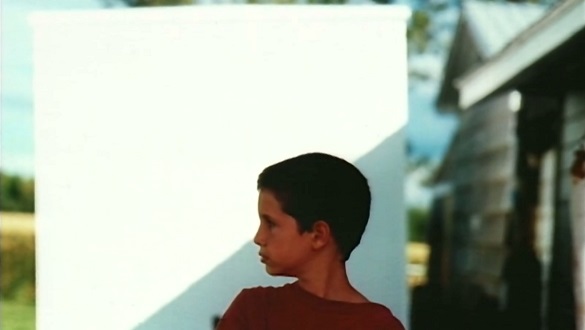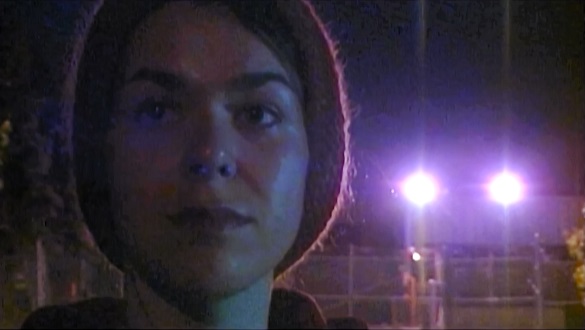
Les premiers courts métrages de Denis Côté disponibles pour la première fois dans une restauration approuvée par le cinéaste.

Un jour, alors qu’il était critique et auteur de courts métrages, Denis Côté a arrêté d’écrire sur le cinéma pour mieux se consacrer à sa réalisation. Jusque-là, il avait alterné entre petits textes percutants et courts films dérangeants, dans une posture généralement subversive car intègre avant tout. Pas question de faiblir face aux sirènes de l’industrie, de céder un pouce aux producteurs accros ou d’écouter la comptine des communiqués de presse… Tout ça pour se donner l’espace nécessaire, un peu de tape et de temps, pour imaginer cette manière redoutable qu’il a d’encadrer la marginalité.
Le programme inaugural du Panoptique aborde cette période fondamentale et méconnue de l’œuvre de Denis Côté, celle de ses premiers courts métrages, par la présentation d’une restauration de huit d’entre eux, réalisés entre 1999 et 2005. Sous la patine du Betacam et de la MiniDV (que la restauration n’a pas cherché à dénaturer), ces huit films se démarquent par leur refus conséquent des conventions et par une méfiance de la fiction dans sa forme la plus scénarisée. Old Fashion Waltz (1999) ressemble à une cassette louée dans Ringu (1998), mais révèle aussi une région excentrée et fantomatique, s’accrochant à des bouts de lumière comme d’avenir. On y voit déjà les obsessions expressionnistes d’Elle veut le chaos (2008) et de Répertoire des villes disparues (2019), en même temps qu’on demeure fascinés par la cohérence de leurs origines dans le documentaire trafiqué, se faufilant le long de la ligne censée séparer la fiction du réel.
La Seconde valse (2000) étend chez lui le périmètre du documentaire vers un versant plus lumineux de la région. Par la grâce de deux gamins rieurs, la ruralité s’impose dans un temps de l’innocence et du souvenir des jours heureux. Évidemment, c’est là déjà qu’on comprend une chose qui ne s’est pas encore démentie dans l’œuvre de Côté : toute idylle est un leurre ironique chez lui. Comme lorsqu’il « nostalgise » la présence de ses deux jeunes sujets, le temps s’arrêtant dans l’éphémère du bonheur. Comme aussi lorsqu’il filme l’indifférence des animaux en captivité, à la fin de ce court-ci et dans Bestiaire (2012), ou encore comme lorsqu’il capte l’excitation flottant autour des préparatifs d’une compétition « athlétique » en habits de pompier, lointaine ancêtre de la course aux citrouilles géantes qui ouvrait Wilcox (2019).

Avec Kosovolove (2000), il s’attaque au drame de chambre. D’ailleurs, ses textes critiques de l’époque, citant Eustache, Tarr, Tsiang et Dumont, laissent présager une hygiène politique des corps : ni soumis ni comblés, les amants télescopent, parfois sans le savoir, une crise humanitaire à partir d’un couple existentiel (incluant ici la précise Johanne Haberlin, qui deviendra une habituée du cinéaste). On retrouvera la force centripète qui anime ce huis clos dans les relations amoureuses de tout son cinéma, avec cette soif d’un bout du monde à partager creusée de travers par des blessures encore ouvertes, faisant des personnages de Côté des personnages qui étouffent tout en continuant d’espérer respirer — ce qui ne les empêche pas d’être fiers et de bien cacher leurs souffrances, au risque parfois de paraître cruels. Impossible de ne pas deviner dans cette tension duelle les dynamiques qui grandiront ensuite dans Nos vies privées (2007), Curling (2010), Vic+Flo ont vu un ours (2013), Boris sans Béatrice (2016), jusqu’à l’épure comique et sans cachotteries d’Hygiène sociale (2021).
Il n’y a guère d’idéalisme dans cette trajectoire sentimentale du repli, sinon dans ce que Denis Côté souhaite invoquer du cinéma afin de faire résonner différemment la condition humaine et, en particulier, la frange ostracisée qui intéresse le moins le cinéma québécois célébré à l’époque où il réalise ses courts métrages. Encore une fois, ses articles rédigés en parallèle détaillent bien son exaspération face au 7e art commercial, celui fait à la petite semaine, alors que, durant ces années, l’industrie locale se plaît de plus en plus à se contempler en tant qu’industrie. C’est sans doute par ce refus de toute banalité du réconfort que son cinéma se tournera si aisément vers les marginaux et les exploités, les rendant plus originaux que toutes figures d’un réalisme inventé pour se caser dans n’importe quelle structure, narrative comme subventionnaire.
Rejoue-moi ce vieux mélodrame (2001) et La sphatte (2003) poussent loin dans cette direction, c’est-à-dire dans celle du récit de biais, avec des corps errants, à la dérive dans le béton montréalais que leur présence, imprévue ou chorégraphiée, poétise. La menace pèse ; qu’elle est-elle ? d’où vient-elle ? De partout et de nulle part à la fois, car ce cinéma n’est pas plus paranoïaque qu’il n’est naïf : le mal de l’époque gronde toujours, il ne vaut pas toujours la peine d’être expliqué ni décortiqué. Dans cette banalité du mal-être urbain, Côté s’intéresse surtout à dégager de la poésie quand tout le monde lève le nez, les passants comme la compassion institutionnalisée. Ses personnages esseulés avancent alors inlassablement dans ces deux fictions qui frôlent l’anti-fiction, comme dans une conscience incarnée et aiguë des limites parfois épuisées du cinéma narratif.

Entre les deux, sa Mécanique de l’assassin (2002) est un film joueur, forcément plus personnel car tourné en famille au Nouveau-Brunswick. Côté est entendu derrière la caméra, complice et narrateur d’une vraie fausse journée de labeur. Il filme la machinerie, les patates, le travail, tout en faisant une passe latérale périlleuse à ses sujets qui se fictionnalisent à notre insu. On reconnaît par la bande le critique fasciné par Bresson et ses « modèles » qui se contentent « d’être » plutôt que de « jouer », dans une mise en scène axée sur une distanciation des sentiments qui leur permet de mieux respirer. Alors qu’on parlait plus tôt d’étouffement, rien chez Côté ne semble aussi oxygéné que ses films sur le travail : Carcasses (2009), Que ta joie demeure (2014), Ta peau si lisse (2017), d’autres films qui font confiance et qui s’efforcent de passer le relais de la fiction aux personnes filmées.
Alors que la majorité de ses thèmes et de ses stratégies de mise en scène — car il en fallait de la tactique pour tourner de beaux films dans ces temps du numérique pré-HD — se condensent dans le coup de circuit que sera Les états nordiques (2005), Côté signe deux courts dans le cadre de Kino, derniers tours de piste avant d’entrer dans une phase nouvelle de sa carrière. Tennessee (2005, tourné en marge du Festival du nouveau cinéma) et Les jouets (2005, filmé pendant le Festival de Trouville), réalisés après qu’il ait remporté le Léopard d’or de la compétition vidéo à Locarno la même année, jouent sur les faux semblants, sur la capacité du cinéma à produire du malaise, puis à le détricoter des situations ordinaires. Que ce soit en juxtaposant des gémissements de téléphone rose sur la routine d’une ménagère d’hôtel ou en faisant passer Christian LeBlanc, son acteur des États nordiques, pour un inquiétant personnage trimbalant des jouets, ces courts achèvent de réitérer les thèmes et les formes de cette première partie de l’œuvre de Denis Côté, tout en affichant très nettement ses horizons à venir.
Ce jeu des similitudes et de l’archéologie cinéphile pourrait continuer encore longtemps, mais pour poursuivre cet accompagnement, nous vous proposons plutôt de télécharger gratuitement le livret disponible ci-haut, sur cette page : une sélection de plus de 25 des meilleurs textes écrits par Denis Côté durant ces mêmes années 1999-2005, alors qu’il était critique de cinéma pour l’hebdomadaire montréalais ICI. En complément de programme, une trouvaille exclusive et paléontologique : le tape de repérage des États nordiques, remonté par les bons soins de Joël Morin-Ben Abdallah (monteur astucieux des films de Sophie Bédard-Marcotte). Une manière, encore une fois, de rendre visible la mécanique du cinéma de Denis Côté, sa genèse, son apprentissage et sa métabolisation en auteur authentique, implacable et décidé à trouver de nouvelles manières de filmer.
